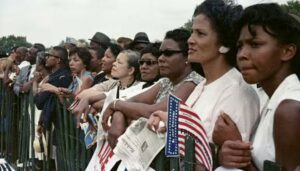The Women Who Stood with Martin Luther King, Jr. and Sustained a Movement for Social Change
Historian Vicki Crawford was one of the first scholars to focus on women’s roles in the civil rights movement. Her 1993 book, “Trailblazers and Torchbearers,” dives into the stories of female leaders whose legacies have often been overshadowed.
Today she is the director of the Morehouse College Martin Luther King Jr. Collection, where she oversees the archive of his sermons, speeches, writings and other materials. Here, she explains the contributions of women who influenced King and helped to fuel some of the most significant campaigns of the civil rights era, but whose contributions are not nearly as well known.
An activist in her own right
Coretta Scott King is often remembered as a devoted wife and mother, yet she was also a committed activist in her own right. She was deeply involved with social justice causes before she met and married Martin Luther King Jr., and long after his death.
Scott King served with civil rights groups throughout her time as a student at Antioch College and the New England Conservatory of Music. Shortly after she and King married in 1953, the couple returned to the South, where they lent their support to local and regional organizations such as the NAACP and the Montgomery Improvement Association.
They also supported the Women’s Political Council, an organization founded by female African American professors at Alabama State University that facilitated voter education and registration, and also protested discrimination on city buses. These local leadership efforts paved the way for widespread support of Rosa Parks’ resistance to segregation on public busing.
Following her husband’s assassination in 1968, Scott King devoted her life to institutionalizing his philosophy and practice of nonviolence. She established the King Center for Nonviolent Social Change, led a march of sanitation workers in Memphis and joined efforts to organize the Poor People’s Campaign. A longtime advocate of workers rights, she also supported a 1969 hospital workers’ strike in South Carolina, delivering stirring speeches against the treatment of African American staff.
Scott King’s commitment to nonviolence went beyond civil rights at home. During the 1960s, she became involved in peace and anti-war efforts such as the Women’s Strike for Peace and opposed the escalating war in Vietnam. By the 1980s, she had joined protests against South African apartheid, and before her death in 2006, she spoke out in favor of LGBT rights – capping a lifetime of activism against injustice and inequalities.
